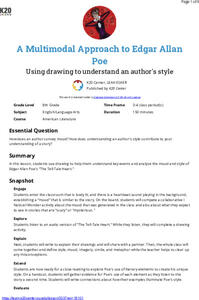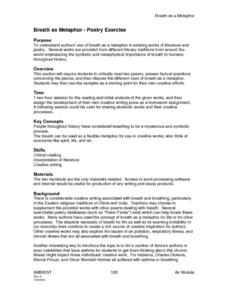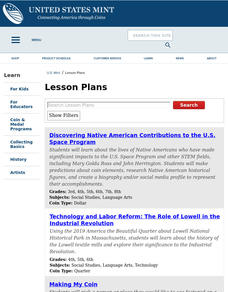National Woman's History Museum
Women, Propaganda, and War
Governments rely on propaganda to build support for wars. Class members examine six propaganda posters, two each from the Spanish-American War, World War I, and World War II, and analyze how the way women were portrayed in the posters...
Teach With Movies
The Great Gatsby
Are you thinking about incorporating a film version of F. Scott Fitzgerald's classic novel in a study of The Great Gatsby? Check out a guide loaded with suggestions for how to supplement a reading of the novel with scenes from three film...
National Endowment for the Humanities
Language Analysis Based on Stave 1
Class members meet the original scrooge, the Dickens character whose name has become synonymous with a cold-hearted, tight-fisted, miser. Using the provided worksheet, readers closely examine context clues to determine the meanings of...
National Endowment for the Humanities
Scrooge as He is Revealed during the Ghostly Experiences
Readers learn how to use both direct and indirect characterization clues provided by Charles Dickens to understand the complexity of Ebenezer Scrooge's character. Scholars collect evidence of comments Scrooge hears, how he responds to...
National Endowment for the Humanities
Theme Analysis in A Christmas Carol
Why does Charles Dickens have Ebenezer go from scrooge to light-hearted and generous? From "Bah, humbug!" to "God Bless Us, Every One!" After rereading Dickens' preface to A Christmas Carol, learners analyze quotations from the tale that...
National Endowment for the Humanities
Toni Morrison's Beloved: For Sixty Million and More
Complex, disturbing, and challenging, Beloved is the focus of a lesson that provides three activities to guide a close reading of Toni Morrison's novel. Readers create chapter titles based on key plot elements or themes, identify...
K20 LEARN
Power To The People: Bill Of Rights Art
The works of Juane Quick-to-see Smith are featured in a lesson that asks pupils to consider the role artists play in bringing about social and political change. Scholars examine protest art by Smith and several street artists and...
K20 LEARN
A Multimodal Approach To Edgar Allan Poe Using Drawing To Understand An Author's Style
True! Poe's "The Tell-Tale Heart" makes readers nervous. But how? Young scholars create a drawing while listening to a reading of Poe's eerie tale to understand how writers create the mood of their stories and what their writing style...
K20 LEARN
Criminal Motivations: Irony and Characterization In "The Cask Of Amontillado"
Edgar Allan Poe's short story "The Cask of Amontillado" is a bit of a puzzle. Critics have long debated Montresor's motives for killing Fortunato. Young scholars examine examples of the three types of irony (verbal, dramatic, and...
K20 LEARN
Lord of the Flies Unit, Lesson 3: Behind the Mask
After watching a video about masks from many cultures, class members research the history of masks and build a Driving Question Board. Individuals then create a mask for a character from The Lord of the Flies, justifying elements of...
K20 LEARN
Lord of the Flies Unit, Lesson 7: Good To Be Bad
The seventh lesson in the Lord of the Flies unit asks scholars to consider whether or not an individual can overcome the worst thing they have ever done. Groups read different articles related to the question, share their expertise in a...
K20 LEARN
Lord of the Flies Unit, Lesson 4: Bad to the Bone
Is the nature of humans inherently good or evil? That is the question scholars consider in the fourth lesson of the Lord of the Flies unit. In a Four Corners activity, they examine statements about human nature and stand by the poster...
Anti-Defamation League
Should Washington's NFL Team Change Their Name?
"What's in a name?" Is it irrelevant, as Juliet suggests in Shakespeare's play, or is nomenclature deeply significant? Young scholars weigh in on the debate by examining the controversy over the NFL's Washington, D.C. Redskins. Groups...
K20 LEARN
Where I'm From: Poetry
We carry memories of where we're from; tweens and teens can capture these memories by first listening to several memory poems and then crafting their own. They analyze literary devices other poets use, brainstorm a list of images they...
K20 LEARN
It’s Never Too Late to Apologize: Character Development and Theme in “The Scarlet Ibis”
Sometimes saying I'm sorry just doesn't cut it. Scholars examine a series of apology poems, songs, and stories and consider each speaker's regrets. Using what they have learned, they analyze James Hurst's short story, "The Scarlet Ibis,"...
K20 LEARN
It Wasn't Me: "The Crucible"
Scholars complete their study of the collective fear in Arthur Miller's "The Crucible" by conducting a mock trial to determine how many witches are in the class. Groups then analyze sections of the play for the literary devices used and...
K20 LEARN
"The Interlopers": Are You Ready to Rumble? Conflict, Motivation, and Setting
Capulets and Montagues. Sharks and Jets. Nortenos and Surenos. Gradwitzes and Znaeyms? Hector Hugh Munro's short story "The Interlopers" invites high schoolers to consider the causes of conflicts and reflect on what it takes to resolve...
Curated OER
Abigail and John in Love
The second instructional activity in the series asks groups to analyze an exchange of love letters between Abigail and John Adams. Scholars identify the many allusions and references in the letters and consider what they can infer about...
Curated OER
Celebrating Canada
Fourth graders investigate Canadians of diverse cultures and ethnic backgrounds. They describe the multicultural, multiracial and multi-ethnic character of Canadian society and take age-appropriate actions to demonstrate their ...
Curated OER
King Arthur: Man or Legend
Learners research the Legend of King Arthur. In this King Arthur activity, students explore him as he is presented in stories, poems, and art. Learners compare and contrast the real life of King Arthur versus the man in legends and...
Curated OER
Inuit Lesson
Students investigate the Inuit People. In this Inuit activity, students locate where they live on a map, outline their history and describe their lifestyle. Students play Inuit games, practice using the Inuit alphabet and examine the...
Curated OER
ADULT ESOL LESSON PLAN--Safety and Security
Students explore/examine danger/warning signs in the United States as well as those in other international countries. In addition, they review a lengthy vocabulary list to assist them with pictures and products to insure safety and...
Curated OER
Breath as Metaphor - Poetry Exercise
Students are required to critically read two poems, answer factual questions concerning the pieces, and then discuss the different uses of breath as a metaphor. They use the samples as a starting point for their own creative efforts.
Curated OER
Ancient Myths Retold
Students are introduced to mythology and create modern versions of ancient myths based on figures represented on modern U.S. coins.
Other popular searches
- Dream Symbolism
- Symbolism in Literature
- Edgar Allen Poe Symbolism
- Flag Symbolism
- Flower Symbolism
- The Raven Symbolism
- Symbolism and Allegory
- Symbolism in Poetry
- Symbolism Art
- Animal Symbolism
- Texas Flags Symbolism
- Scarlet Letter Symbolism

























